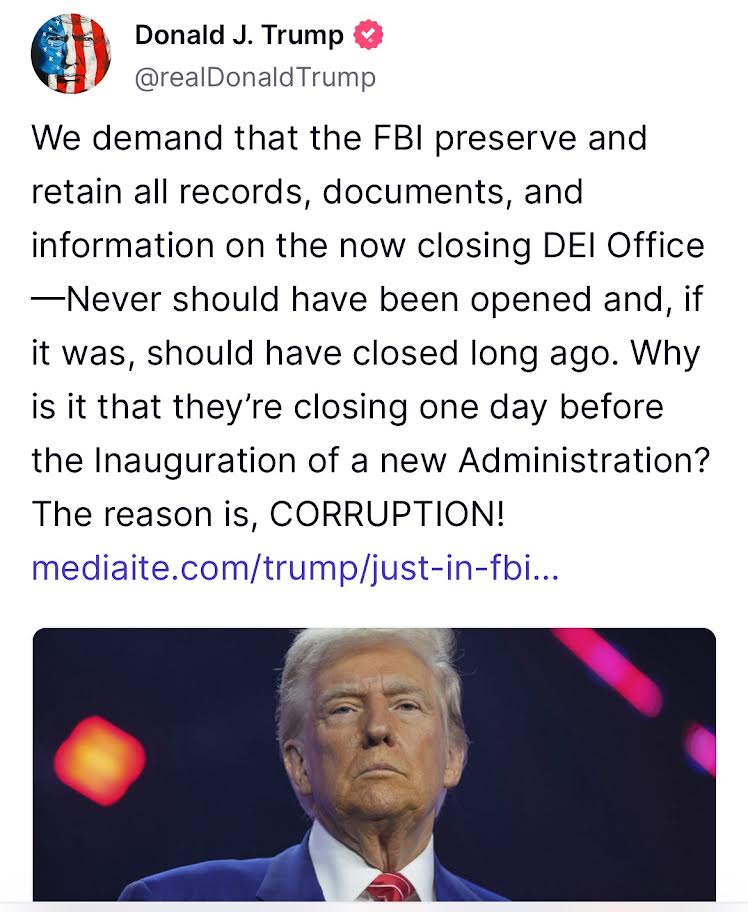🔴 Website 👉 https://u-s-news.com/
Telegram 👉 https://t.me/usnewscom_channel
Former President Donald Trump has ordered the FBI to preserve all records related to its recently shuttered Diversity, Equity, and Inclusion (DEI) office, accusing the agency of attempting to cover its tracks just before his administration begins. The closure of the DEI office last month was confirmed by the FBI, but no reason was given, prompting skepticism about its timing and intent.
Trump’s demand, delivered via a strongly worded statement, leaves no room for ambiguity.
“We demand that the FBI preserve and retain all records, documents, and information on the now closing DEI Office,” Trump said. “Never should have been opened and, if it was, should have closed long ago. Why is it that they’re closing one day before the inauguration of a new administration? The reason is, CORRUPTION!”
The move comes as Trump prepares to take office and implement sweeping changes to federal agencies, with the FBI at the top of his list.
The FBI confirmed in December that its DEI office had been disbanded, stating that the office would cease operations by the end of 2024. Critics of the initiative argue that DEI efforts have distracted from the agency’s mission to protect national security.
Conservative lawmakers, including Senator Marsha Blackburn (R-TN), have been vocal about their concerns. Blackburn recently sent a letter to outgoing FBI Director Christopher Wray, urging the bureau to refocus on counterterrorism and law enforcement rather than diversity initiatives.
Her letter came in the wake of a New Year’s Day terror attack in New Orleans, in which a suspect drove a truck into a crowd, killing 14 people and injuring dozens more. Blackburn questioned whether the FBI’s resources were being misallocated toward DEI efforts instead of addressing critical national security threats.
“This horrific incident constitutes a blatant act of terror on the American homeland,” Blackburn wrote. “The people of our country deserve to know whether federal law enforcement agencies can sufficiently prevent and respond to such incidents.”
The closure of the DEI office occurred during the final weeks of Wray’s tenure as FBI Director, fueling speculation that the agency aimed to avoid scrutiny under Trump’s incoming administration. Wray announced his resignation in November, a move seen by many as an acknowledgment that his leadership would not align with Trump’s vision for the bureau.
The timing has drawn criticism from Trump and his allies, who argue that the FBI’s decision to disband the office just before a change in administration indicates an attempt to evade accountability.
Trump’s nomination of Kash Patel as the next FBI Director underscores his intent to overhaul the agency. Known for his hardline stance on “woke” policies, Patel is expected to prioritize reforming the FBI’s internal practices and addressing concerns about politicization.
Patel’s leadership is likely to result in a comprehensive review of the DEI office’s operations and the reasoning behind its closure. Supporters of Patel’s appointment view this as a necessary step to restore focus on the FBI’s primary mission of safeguarding national security.
However, critics argue that dismantling DEI initiatives undermines progress toward inclusivity within federal agencies. Advocates for DEI programs contend that diversity strengthens institutions and enhances their ability to serve the public effectively.
The New Orleans terror attack, which left 14 dead and dozens injured, has amplified calls for a shift in federal law enforcement priorities. Blackburn’s letter to Wray highlighted concerns that DEI initiatives may have diverted resources from addressing pressing security threats.
The suspect in the attack, armed with weapons and an ISIS flag, drove a truck into a crowd on Bourbon Street. Among the injured were two police officers who engaged in a gunfight with the attacker. The incident has raised questions about whether federal agencies are adequately prepared to prevent such attacks.
“We need justice, accountability, and focus from our federal agencies,” Blackburn said. “Programs like DEI have no place in an agency tasked with protecting American lives.”
Trump’s order to preserve DEI-related records signals his administration’s intent to investigate the program thoroughly. If preserved, these records could provide insights into the office’s operations, its impact on the FBI’s priorities, and the motivations behind its closure.
For Trump and his allies, the disbanding of the DEI office represents a long-overdue correction of what they perceive as misplaced priorities within federal institutions. For opponents, it marks a step backward in efforts to promote diversity and equity within government agencies
As Trump prepares to assume office, the controversy surrounding the FBI’s DEI office and its closure is unlikely to fade. With Kash Patel set to lead the bureau, significant changes are expected, sparking debates over the role of diversity initiatives in federal agencies and their alignment with core missions.
The clash over DEI at the FBI is emblematic of broader ideological divisions in American politics, highlighting competing visions for the future of law enforcement and governance. Whether Trump’s directive leads to greater accountability or further polarization remains to be seen.

